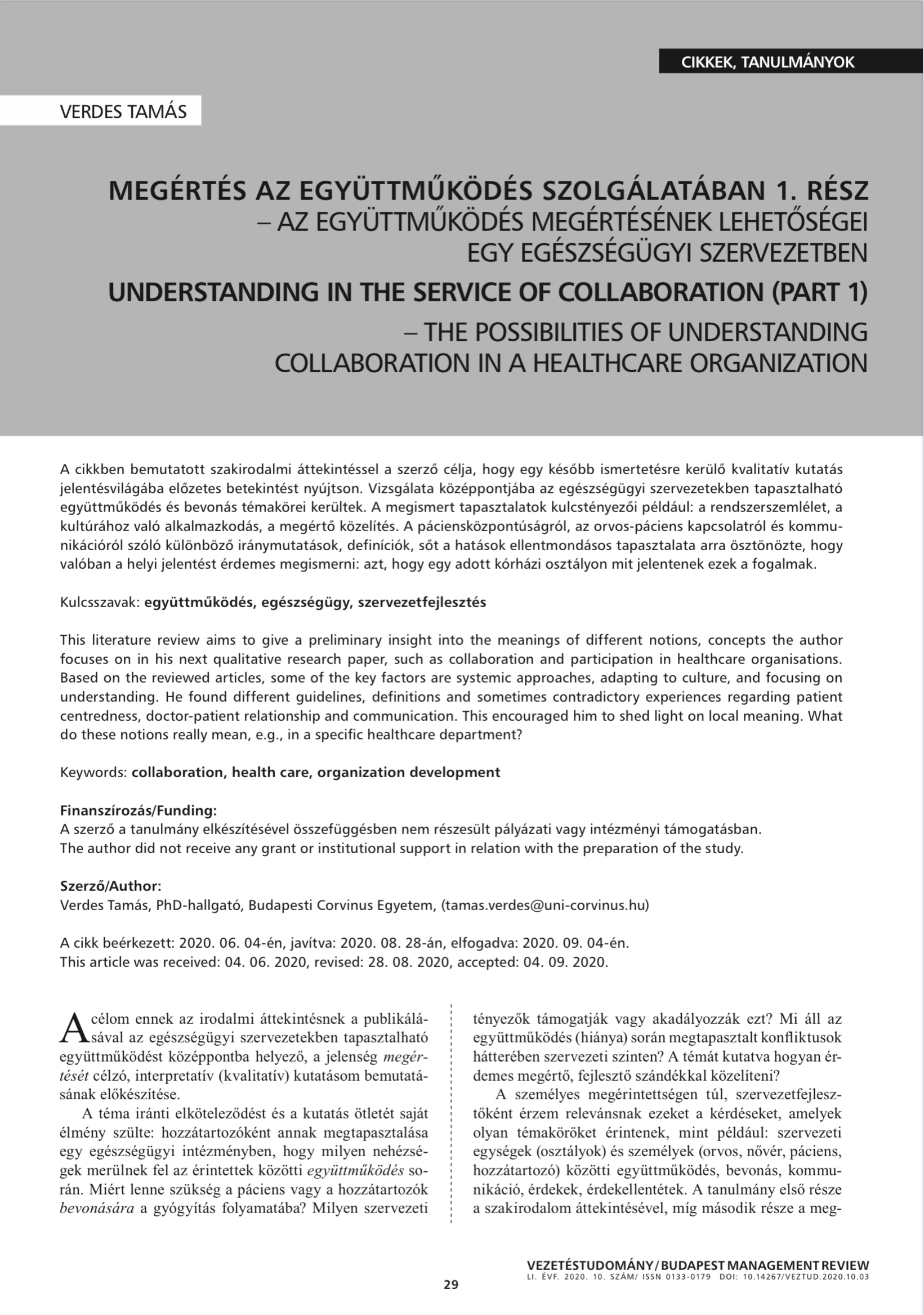Megértés az együttműködés szolgálatában 1. rész
Az együttműködés megértésének lehetőségei egy egészségügyi szervezetben
DOI:
https://doi.org/10.14267/VEZTUD.2020.10.03Keywords:
collaboration, health care, organization developmentAbstract
This literature review aims to give a preliminary insight into the meanings of different notions, concepts the author focuses on in his next qualitative research paper, such as collaboration and participation in healthcare organisations. Based on the reviewed articles, some of the key factors are systemic approaches, adapting to culture, and focusing on understanding. He found different guidelines, definitions and sometimes contradictory experiences regarding patient centredness, doctor-patient relationship and communication. This encouraged him to shed light on local meaning. What do these notions really mean, e.g., in a specific healthcare department?
Downloads
References
Borbás, I., Németh, Gy., Villusz, L., Lux, L., & Juhász, J. (2004). Az egészségügyi ellátórendszer és tulajdonviszonyai. In Kincses Gy. (Ed.), Magyarország egészségügye és szociális rendszere (pp. 45-58). Budapest: Medinfo, Nemzeti Család és Szociálpolitikai Intézet.
Burrell, G., & Morgan, G. (1979). Sociological Paradigms and Organisational Analysis. Oxford: Heinemann Educational Books Ltd.
Cocowitch, B. V., Orton, S., Daniels, J., & Kiser, D. (2013). Reframing Leadership Development in Healthcare. OD Practitioner, 45(3), 10-18.
de Haes, H. (2006). Dilemmas in patient centeredness and shared decision making: A case for vulnerability. Patient Education and Counseling, 62(3), 291-298. https://doi.org/10.1016/j.pec.2006.06.012
French, W. L., & Bell, C. H. (1995). Organization Development (5th ed.). Upper-Saddle River: Prentice- Hall International Inc.
Gelei, A. (2006). A szervezet interpretatív megközelítése. Vezetéstudomány, 38(1 ksz.), 79-97.
Gelei, A. (2020). Szervezetfejlesztés szerepe a sportpszichológiában. In Zs. Imre Tóvári, G. Simonné Goschi, & Á. Pálvölgyi (Eds.), A sportpszichológia tankönyve. Budapest: Medicina Könyvkiadó (szerkesztés alatt).
Goh, S. C., Chan, C., & Kuziemsky, C. (2013). Teamwork, organizational learning, patient safety and job outcomes. International Journal of Health Care Quality Assurance, 26(5), 420-432.
Győrffy, Zs. (2019). E-páciensek és digitális gyógyítóik. Magyar Tudomány, 180(10), 1471-1480. https://doi.org/10.1556/2065.180.2019.10.6
Long, S. (2001). Cooperation and conflict: two sides ot the same coin. In R. Wiesner & B. Millett (Eds.), Management and Organisational Behaviour (pp. 95-108). Milton: John Wiley and sons Australia Ltd.
Málovics, É., Vajda, B., & Kuba, P. (2009). Paternalizmus vagy közös döntés? Páciensek az orvos-beteg kommunikációról. In E. Hetesi, Z. Majó, & M.
Lukovics (Eds.), A szolgáltatások világa (pp. 250-264). Szeged: JATEPress.
Menzies-Lyth, I. (1988a). Containing Anxiety in Institutions. New York: Free Association Books.
Nemzeti Egészségbiztosítási Alapkezelő. (2018). Fekvőbeteg (kórházi) ellátás. Retrieved from http://www.neak.gov.hu/felso_menu/lakossagnak/ellatas_magyarorszagon/egeszsegugyi_ellatasok/fekvobeteg_korhazi_ellatas/fekvobeteg_ellatas.html
PAF Közhasznú Alapítvány. (2020). Pozitív Attitűd Formálás. Az emberibb egészségügyért. Retrieved from www.pafhungary.hu
Pradarelli, J. C., Jaffe, G. A., Lemak, C. H., Mulholland, M. W., & Dimick, J. B. (2016). A leadership development program for surgeons: First-year participant evaluation. Surgery, 160(2), 255-263. https://doi.org/10.1016/j.surg.2016.03.011
Ratnapalan, S., & Uleryk, E. (2014). Organizational Learning in Health Care Organizations. Systems, 2(1), 24-33. https://doi.org/10.3390/systems2010024
Senge, P. M. (1998). Az ötödik alapelv. Budapest: HVG Kiadó.
Stoelwinder, J. U., & Clayton, P. S. (1978). Hospital Organization Development: Changing the Focus from ‘Better Managenment’ to „Better Patient Cared. The Journal of Applied Behavioral Science, 14(3), 400-414. https://doi.org/10.1177/002188637801400314
Sweet, V. (2014). Isten Hotel – Gyógyító figyelem a modern orvoslásban. Budapest: HVG Kiadó Zrt.
Szeverényi, P. (2008). A családközpontú szülészeti gyakorlat lehetőségei a lelki egészség megőrzésében. Nőgyógyászati És Szülészeti Továbbképző Szemle. Retrieved from http://medicalonline.hu/gyogyitas/cikk/a_csaladkozpontu_szuleszeti_gyakorlat_lehetosegei_a_lelki_egeszseg_megorzeseben
Tempfer, C. B., & Nowak, P. (2011). Consumer participation and organizational development in health care: A systematic review. Wiener Klinische Wochenschrift, 123(13-14), 408-414. https://doi.org/10.1007/s00508-011-0008-x
The Joint Commission. (2008). Health Care at the Crossroads: Guiding Principles for the Development of the Hospital of the Future.
Thompson, A. G. H. (2007). The meaning of patient involvement and participation in health care consultations: A taxonomy. Social Science & Medicine, 64(6), 1297-1310. https://doi.org/10.1016/j.socscimed.2006.11.002
Weisbord, M. R. (1976). Why Organization Development Hasnʼt Worked (So Far) In Medical Centers. Health Care Management Review, 1(2), 17-28.

Downloads
Published
How to Cite
Issue
Section
License
Authors assign copyright to Vezetéstudomány / Budapest Management Review. Authors are responsible for permission to reproduce copyright material from other sources.

